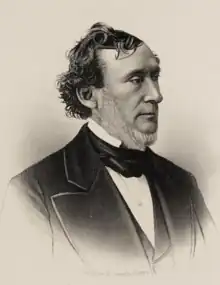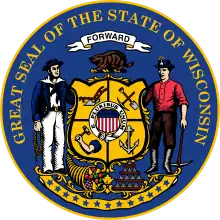The Honorable Mortimer M. Jackson | |
|---|---|
 | |
| Justice of the Wisconsin Supreme Court | |
| In office September 1848 – June 1, 1853 | |
| Wisconsin Circuit Court Judge for the 5th Circuit | |
| In office September 1848 – June 1, 1853 | |
| Preceded by | Position Established |
| Succeeded by | Montgomery M. Cothren |
| 3rd and 5th Attorney General of the Wisconsin Territory | |
| In office 1845 – January 22, 1846 | |
| Governor | Henry Dodge |
| Preceded by | William Pitt Lynde |
| Succeeded by | A. Hyatt Smith |
| In office June 26, 1842 – 1844 | |
| Governor | James Duane Doty |
| Preceded by | Horatio Wells |
| Succeeded by | William Pitt Lynde |
| Personal details | |
| Born | Mortimer Melville Jackson March 5, 1809 Rensselaerville, New York |
| Died | October 13, 1889 (aged 80) Madison, Wisconsin |
| Resting place | Forest Hill Cemetery Madison, Wisconsin |
| Nationality | American |
| Political party |
|
| Spouses |
|
| Occupation | lawyer, judge |
Mortimer Melville Jackson (March 5, 1809 – October 13, 1889) was an American lawyer, judge, and diplomat. He was a justice of the original Wisconsin Supreme Court from 1848 through 1853 and was later a United States consul general in Canada for twenty years. Prior to Wisconsin statehood, he was Attorney General of the Wisconsin Territory.
Biography
Jackson was born in Rensselaerville, New York.[1] He received his education in New York City, where he studied law and was admitted to the bar. In 1838, Jackson moved to Milwaukee,[1] and then in 1839, to Mineral Point, Wisconsin Territory,[1] where he practiced law, involving the lead-mining industry.[2]
In 1842, Wisconsin Territorial Governor James Duane Doty appointed Jackson Attorney General of the Wisconsin Territory, where he served until 1846.[1] When Wisconsin became a state in 1848, Jackson was elected one of the first five Wisconsin Circuit Court judges. At the time, the Wisconsin Supreme Court was constituted of the five circuit court judges; thus, Jackson was also a justice of the Wisconsin Supreme Court until a separate Supreme Court was formed in 1853.[1]
Politically, Judge Jackson was involved with the Whig Party from as early as 1834, and joined the Republican Party when it was formed in the 1850s.[1] In 1857 he was a candidate for the United States Senate, but was defeated by James Rood Doolittle. In 1861, President Abraham Lincoln appointed Jackson United States consul general in Halifax, Canada.[2] As consul general, he was instrumental in the seizure of about $3,000,000 worth of Confederate property during the American Civil War (about $49,000,000 in inflation-adjusted dollars).[1] He would remain in this role for 21 years until his retirement in 1882. He then returned to Madison, Wisconsin, where he died seven years later at the Park Hotel.[3][1]
Legacy
Jackson's will donated $20,000 to the Law School at the University of Wisconsin to create the Mortimer M. Jackson Professorship of Law.[4][5][6][2]
Electoral history
Wisconsin Attorney General (1857)
| Party | Candidate | Votes | % | ±% | |
|---|---|---|---|---|---|
| General Election, November 3, 1857 | |||||
| Democratic | Gabriel Bouck | 44,764 | 50.23% | -1.00% | |
| Republican | Mortimer M. Jackson | 44,362 | 49.77% | ||
| Plurality | 402 | 0.45% | -1.99% | ||
| Total votes | 89,126 | 100.0% | +22.35% | ||
| Democratic hold | |||||
References
- 1 2 3 4 5 6 7 8 "A Pioneer Jurist Gone". The Representative. October 18, 1889. p. 2. Retrieved April 16, 2018 – via Newspapers.com.

- 1 2 3 Berryman, John R., ed. (1898). History of the Bench and Bar of Wisconsin. Vol. 1. Chicago: H. C. Cooper, Jr. pp. 98–101. Retrieved January 19, 2020.
- ↑ "Wisconsin Court System - Mortimer M. Jackson". Archived from the original on 2011-07-21. Retrieved 2011-02-22.
- ↑ "Generous Jackson". The Oshkosh Northwestern. October 16, 1889. p. 1. Retrieved April 17, 2018 – via Newspapers.com.

- ↑ "Mortimer M. Jackson (1809-1889)". Wisconsin Court System. Retrieved April 17, 2018.
- ↑ Blue Book of the State of Wisconsin. Madison: Democrat Printing Company. 1907. p. 763.
- ↑ "Official Footings". Wisconsin State Journal. Madison, Wisconsin. December 5, 1857. p. 2. Retrieved August 8, 2020.
